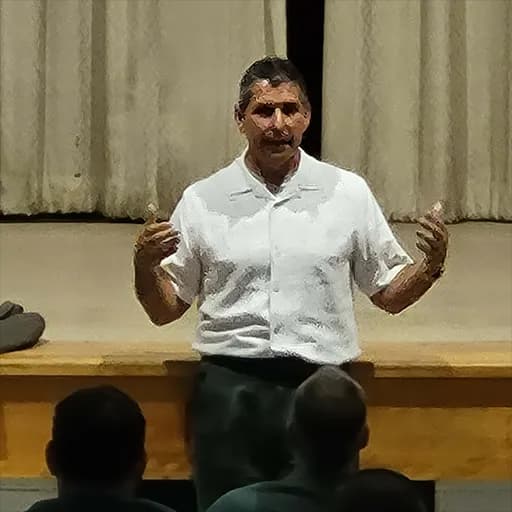We left Rochester early Thursday morning, aiming to arrive at the Federal Prison Camp in Duluth by 7:30 a.m. As always, Senior Deputy Regional Director Eric Williams had his SUV warmed up by the time I walked out from the hotel lobby. His consistency set the tone for another full day of outreach and learning.
I looked forward to returning to Duluth, understanding that this visit would bring a different dynamic—a camp environment instead of a secure facility. With only a few hundred men at the camp, the atmosphere would be smaller and more personal. That intimacy allows for deeper, more authentic conversations, and I looked forward to engaging with the men.
Meeting Warden Billie Eischen
When we arrived, Warden Billie Eischen greeted us with a warm handshake and an easy smile. A former athlete, he carried himself with calm confidence—a leader who listens first and speaks with purpose. It was my first time meeting him, and I immediately appreciated his approachable nature.
Wardens in the Bureau of Prisons play an essential role in shaping institutional culture. They set the tone for their teams and model the behavior that filters through every level of staff. For that reason, I always prioritize earning their trust—a process that takes time, consistency, and authenticity.
Warden Eischen expressed strong support for the Regional Director’s vision of introducing innovative, evidence-based programs that motivate people in custody to pursue excellence. He acknowledged that not everyone in the agency initially embraces the idea of a former inmate playing an active role in prison reform. Yet, he also recognized that under Director William Marshall and Deputy Director Josh Smith, the Bureau is evolving. The agency is encouraging both staff and people in custody to align around a shared commitment to Pursuing Excellence.
A Career Shaped by Experience
As we spoke, I learned more about Warden Eischen’s career journey. He began as a correctional officer at FCC Florence, working in the Special Housing Unit at both the USP and the ADX—among the most challenging posts in the federal system. During those early years, he didn’t think much about programs or reentry initiatives. His focus, like that of many line officers, was security and order.
But after a decade of service and several transfers across the Bureau, his perspective began to expand. Through experience, he gained a deeper appreciation for the power of programs—how they can improve institutional culture, reduce conflict, and prepare individuals for meaningful lives after release. That awareness now shapes his leadership philosophy at Duluth.
A Message of Renewal
We walked to the theater, where the morning presentation would take place. I admired how naturally Warden Eischen interacted with the men, encouraging them to participate and making them feel seen.
The room filled quickly. I tailored my message to this audience—men serving shorter sentences who were closer to returning home. I emphasized the importance of using every day as preparation for success. We discussed how documenting progress—through journals, book reports, and release plans—helps individuals demonstrate that they are extraordinary and compelling.
During the session, one man approached me to share that we had been incarcerated together years earlier. After his release, he struggled to adjust, made poor choices, and ultimately returned to custody. He told me that hearing this message gave him renewed purpose—and he pledged to become an ambassador of the program to help others stay focused on their own reentry journeys.
Expanding the Mission
In the afternoon, I gave a second presentation, continuing the conversation about leadership, accountability, and personal transformation. I emphasized that every person inside a federal prison has the capacity to contribute to culture change—by modeling discipline, service, and self-improvement.
I’m grateful to Warden Eischen for the openness he showed and for allowing me to present to his population. His leadership reflects the broader movement across the Bureau—where staff and incarcerated individuals are finding common ground in the pursuit of excellence.
Dinner, Data, and Dedication
After leaving the camp, Eric and I went out for dinner and reflected on the day. We spoke about the importance of highlighting the people who are actively documenting their growth and building evidence of their readiness for reentry.
I showed him the Prison Professors leaderboard, which continues to expand. By that evening, more than 2,800 people had begun the process of building profiles on our platform—an encouraging sign that the message of accountability, preparation, and reform is spreading.
As I thought back on the day, I recognized again how much leadership matters. People like Warden Eischen and Senior Deputy Regional Director Eric Williams embody the same lesson we share inside every institution: success begins with consistency, humility, and service. I’m grateful that I get to play a small role in spreading this message of personal accountability, and advance the concept of earning freedom through merit–building more incentives to get the results we want to see.

